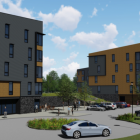Government
With Change at State Level, Officials Now ‘Scrambling’ To Figure Out Funding for Planned Redevelopment of Canaan Parish
|
Officials said Tuesday that they’re “scrambling” in the wake of a change from the state to figure out just how to finance a widely anticipated rebuilding project on the corner of Route 123 and Lakeview Avenue. Plans call for rebuilding Canaan Parish, a 60-unit Section 8 housing complex, in a single five-story structure and construction of a new, 40-unit structure of the same height that would count toward the state’s affordable housing requirement.
Yet the project “is a little bit slowed down because right now the state has no idea as to whether or not there is actually any funding available for affordable housing,” New Canaan Housing Authority Chairman Scott Hobbs told members of the Board of Selectmen at their regular meeting. “We are also in the process of scrambling add finding out alternatives to how we can go ahead without the state funding, and there are some out there,” he said at the meeting, held in Town Hall. “We would rather follow this course and hopefully get our grant. But at the same time we started to lose faith that they are actually going to be able to come through with what we need them to do.”
Approved by the Planning & Zoning Commission last summer following weeks of discussion about early-stage renderings of the proposed new buildings, the project is a joint effort of the Housing Authority and New Canaan Neighborhoods, which owns the buildings.





